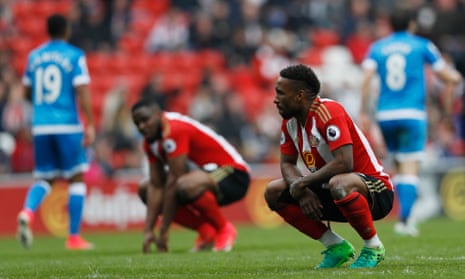Relegation finally became a reality for Sunderland and divorce from David Moyes may not be too far behind it.
A combination of Josh King’s late winner and Hull City’s draw at Southampton pushed Sunderland unceremoniously into the Championship, leaving their manager staring blankly into space.
When the final whistle blew, Moyes, who acknowledges he is considering stepping down at the end of the season, stood a little apart from his assistants. As the calls for his head from a previously very quiet crowd gathered intensity and invective, he looked dejected and alone.
After the bleakest and least imaginative of campaigns punctuated by one-dimensional tactics and inadequate recruitment, it was the least the former Everton, Manchester United and Real Sociedad coach could expect. Yet much as Moyes has failed to impress, many of the club’s manifold problems are rooted in the boardroom where Ellis Short, the owner, should not escape blame.
Given his club’s dramatically superior fanbase and infrastructure – not to mention top-10 wage bill – Short should be ashamed Bournemouth are safely in mid-table while Sunderland supporters contemplate an uncertain future. Yet the beauty of the Premier League is that it remains a meritocracy in which innovative coaches such as Eddie Howe and well-run clubs, however small, can thrive.
By way of reminding their hosts of this reality, Howe’s Bournemouth began by forcing a series of corners. With the lively Marc Pugh clearly on a mission to torment Donald Love, Moyes’s right back, the home defence was soon in all too familiarly shambolic mode.
Admittedly Fabio Borini’s viciously swerving shot forced Artur Boruc into a good save but King, who has scored more goals than Sunderland during 2017, missed four first-half chances as his side monopolised possession.
If Bournemouth were playing a three-dimensional, high-definition passing game, Sunderland’s tactics seemed from the analogue age and principally featured the ball being pumped in Jermain Defoe’s direction as early and directly as possible.
King’s most audacious attempt involved him changing pace, cutting in from the left and unleashing a curving, dipping shot which hit the underside of the bar and the inside of the far post before somehow rebounding, bagatelle style, to safety.
Goodness knows what might have happened if Didier Ndong, Sunderland’s best player, had not been around to hold the home midfield together. The Gabon international’s interceptions repeatedly broke up wave on wave of blue-shirted attacks.
Ndong kept Sunderland in a game in which Moyes’s players might have startled everyone by taking the lead had Defoe not directed a six-yard volley straight at Boruc after springing the offside trap.
After that little cameo Howe started to cut an ever more agitated, and animated, figure in the technical area. Try as they might – and Benik Afobe had a shot blocked by Javier Manquillo, while Love cleared off the line from King – his players’ slight hesitancy in front of goal dictated they could not quite turn their technical and creative advantages into goals.
It left Sunderland harbouring hope of snatching victory on the counterattack. Shortly after Pugh had shot fractionally wide, one such break, early in the second half, concluded with Borini collecting Defoe’s pass and, once again, bringing the best out of Boruc.
By now the attendance figure had been announced as a significantly lower than average yet still a respectable 38,394. No one could be blamed for staying away yet the absentees left an awful lot of vacant red plastic seats – many sun-bleached by the passing years and badly in need of replacing – scattered in clusters around the ground.
Social media posts had suggested there would be vociferous anti-Moyes protests but the mood was strangely subdued, more about apathy than anger and punctuated by lengthy, slightly surreal, silences.
Perhaps the pre-match hint Moyes dropped, indicating he may leave Sunderland in the summer, had drawn the sting from the dissenters and prevented a mutiny or maybe some of England’s most loyal fans simply had no energy left after such a draining, depressing campaign.
There was polite applause when Boruc – by now emerging as a suprisingly influential figure – saved smartly from George Honeyman following Defoe’s cute reverse ball but not even a mass bout of push and shove engaged in by every outfield player could raise the volume.
It began with Borini catching Lewis Cook late, eventually involved everyone piling in to remonstrate with each other and ended with Stuart Attwell booking Borini and Harry Arter.
Clearly aggrieved, King forlornly demanded a penalty in the wake of Lamine Koné’s foul but managed to score in the end anyway. He shot assuredly low and right beyond Jordan Pickford after being played in by Ryan Fraser on a high-speed break.
Cue the first, initially tentative choruses of “We want Moyes out”. By the time they reached peak volume and stridency, their target was staring into space and Sunderland were in the second tier.

Comments (…)
Sign in or create your Guardian account to join the discussion